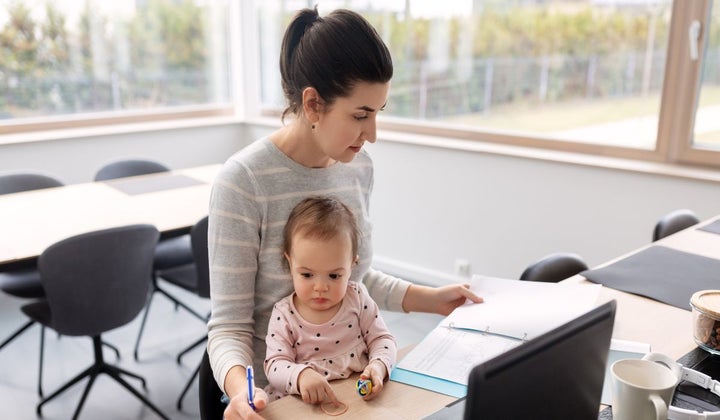In this post
The Top 5 Benefits of Being a Working Parent

It’s no secret that being a working parent can be challenging. Balancing work and family responsibilities can often feel like a juggling act, with little time left for yourself. However, despite the difficulties, there are numerous benefits to being a working parent.
We’ll explore the top five benefits that come with being a working parent and why it’s worth embracing this role.
1. Work-life balance
The concept of work-life balance has been a hot topic in recent years, particularly for working parents. Australians, on average, work between 32 to 38 hours a week, striking a balance that allows them to contribute to the workforce while also being present for the significant moments in their children’s lives.
However, despite the challenges of managing both work and family obligations, many parents find that their careers provide them with a sense of purpose and fulfilment outside of their role as a parent.
Being able to return to work and contribute to the workforce while also being present for important moments in their children’s lives allows for a more holistic and well-rounded approach to life. Working parents often have the opportunity to model the importance of hard work and dedication while also prioritising their family’s needs, leading by example for their children.
2. Financial stability
One of the most significant benefits of being a working parent is financial stability. With two sources of income, working parents can provide for their families and plan for the future with greater security.
This financial stability allows for more significant opportunities, such as homeownership, travel, and investments that can enrich the family’s overall well-being. In fact, recent statistics show that household wealth in Australia increased by $339.4 billion (2.3%) to $15,305.3 billion. Having two working parents can significantly contribute to this economic growth and help secure a more prosperous future for the family.
Moreover, being a working parent often means having access to benefits such as health insurance, retirement plans, and paid time off. These benefits not only provide additional financial protection but also give you peace of mind.
Whether you’re a working parent in Australia or elsewhere, take heart. Your hard work is not only benefiting your family in the present—it’s also paving the way for a more stable, secure future.
3. Career advancement
Contrary to popular belief, parenthood does not hinder career growth but rather enhances it. As more parents are working full-time, many companies now offer flexible work arrangements and support for working parents, recognising the value they bring to the workforce. This shift has opened up opportunities for career progression and personal development that may not have been available before becoming a parent.
Working parents are highly skilled at multitasking, prioritising tasks, and managing time effectively – making upskilling easy in the workforce. Furthermore, being responsible for another little human’s well-being requires exceptional problem-solving abilities and adaptability, which can transfer seamlessly into a professional setting.
In essence, parenthood has become a valuable asset in the workplace, and companies are taking notice. By embracing the challenges and rewards of working parenthood, individuals can excel in their careers and achieve their professional goals.
4. Personal growth
Becoming a working parent often means taking on new roles and responsibilities, which can be challenging but also incredibly fulfilling. Balancing a career and family life requires a constant learning curve, fostering personal growth and development.
Working parents are continually adapting to new challenges, developing new skills, and finding creative solutions to everyday problems. This can lead to increased confidence, self-awareness, and a sense of accomplishment that carries over into all aspects of life.
Moreover, being a working parent can also expose individuals to new perspectives and opportunities for personal growth, such as networking with other parents in similar situations or learning from co-workers with different backgrounds and experiences.
5. Strong support systems
Last but certainly not least, being a working parent also means having a strong support system. Whether it’s a partner, family member, nanny, or daycare provider, having someone to help share the load can make all the difference.
In addition, many companies offer employee assistance programs and resources specifically for working parents, recognising the importance of supporting their workforce in both their personal and professional lives. These support systems can provide valuable advice, resources, and a sense of community for working parents, making the journey more manageable and enjoyable.
Being a working parent may come with its challenges, but it also brings an array of benefits that are often overlooked. From achieving work-life balance to personal growth and career advancement, being a working parent allows individuals to thrive both in and out of the workplace.
As the landscape of traditional work continues to evolve, working parents will continue to play an essential role in shaping a more diverse, flexible, and fulfilling workforce.
Latest Articles
Agriculture Careers: What You Should Know in 2025
As one of Australia's most important industries, the agriculture industry offers great career opport...
Are Digital Skills the Key to Job Security in 2025?
The digital revolution is here, and it doesn’t care if you have a technical job or not — it’s coming...
How to Become a Chef in Australia: Complete Guide for 2025
The complete guide to becoming a chef in Australia. Learn how to get your start and make it in the h...
Want to read more?
10 Workplace Health & Safety (WHS) Tips
Is your workplace safe? Implement these top 10 workplace health and safety (WHS) tips to improve you...
4 Disability Support Worker Skills You Need to Make a Difference
Interested in making a positive difference in the lives of people with disabilities? Learn about dis...
How to Start a Career in Regenerative Agriculture
A career in regenerative agriculture leads to positive effects for the environment and can be a grat...
